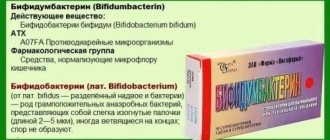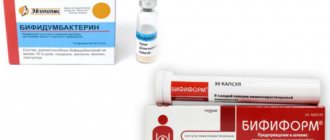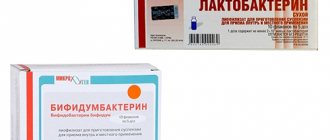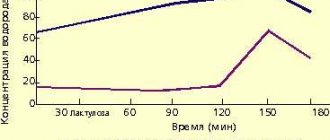Probiotic preparations are widely used for the treatment and prevention of various intestinal disorders in children from infancy to older age. The correct choice of product is especially important for recently born babies, but older children also need careful selection of probiotics.
The little person’s own defense does not begin to work immediately; the immune system takes time to “get acquainted” with the foreign flora that meets the child first in the maternity hospital, then at home, and then in preschool and school institutions. To help the immune system, you should protect your own beneficial bacteria, ensure an influx of “fresh forces” - lacto- and bifidobacteria, as well as auxiliary substances and prebiotics, so that microorganisms can act in full force.
This is why doctors recommend probiotics from an early age. Such products are harmless because they contain bacteria that make up the normal intestinal flora. However, you should consult your pediatrician about taking medications and strictly follow medical instructions.
Bifidumbacterin. Pharmacological characteristics
Bifidumbacterin is a drug that affects the functioning of the gastrointestinal tract.
Bifidumbacterin - refers to substances that affect the gastrointestinal tract. The drug contains 107 live microorganisms - bifidobacteria - in one dose.
The drug is produced in the form of a dry powder for preparing a solution. In appearance, “Bifidumbacterin” powder is beige crystals of varying degrees of intensity. A grayish tint of the drug is allowed. This is not a sign of damage to the product.
In addition to the powder form, they produce ready-made solutions, suppositories for vaginal or rectal administration, and capsules. But for toddlers from 0 to 12 months, these forms are not used. When dissolved in water, an opaque suspension with a characteristic odor and taste is formed.
How does the drug work? The normal microflora of the gastrointestinal tract suppresses opportunistic microorganisms, improves the general condition of the body, and helps increase the immunity of the little man. When is Bifidumbacterin prescribed? The drug is prescribed orally for the treatment of gastrointestinal pathologies and intravaginally in gynecological practice. Bifidumbacterin is prescribed to children in the following cases:
- Acute gastrointestinal pathologies of unknown origin as part of complex therapy.
- Infectious intestinal diseases - dysentery, salmonella, E. coli, staphylococcus.
- Long-term dysfunction of the intestine after acute pathologies.
- In combination in the treatment of weakened, premature children diagnosed with pneumonia or sepsis for the prevention of ulceration and necrosis of the intestinal mucosa.
- Toddlers born before 38 weeks of pregnancy.
- Children who received antibiotics or antibacterial treatment from the first days of life.
- Toddlers whose mothers have been treated for mastitis and are restoring lactation or have cracked nipples.
- Babies whose pregnancy was accompanied by inflammatory diseases of the urogenital tract in women.
- Weakened toddlers, children diagnosed with rickets, whooping cough, allergic reactions of unknown etiology.
- In babies receiving artificial formula or donor breast milk.
Causes of colic
Modern medicine suggests that there are several reasons that cause colic in infants: - swallowing air during feeding; - overfeeding the baby; - overheating of the child; - daily fluctuations in the composition of mother's milk; - immaturity of the digestive tract for the first time 2-3 months of life; — violations of the correct formation of intestinal flora.
After birth, the baby’s entire body begins to work in a new way, he gradually begins to adapt to new nutritional conditions. Due to the fact that the baby’s gastrointestinal tract is not perfect, gases cannot escape on their own and accumulate in the intestines. They cause pain to the baby. The child’s microflora is just beginning to form, and along with it, immunity. Good health and strong immunity are our microflora. Bifidobacteria in children make up 90 to 95% of all types of intestinal microorganisms. In healthy newborns, bifid flora normally occupies a leading position by 5-20 days after birth. Normally, the number of bifidobacteria in the intestines of infants should be 10*10-10*11 CFU/g of feces (in 1 gram of feces there are from 10 trillion to 100 trillion bifidobacteria cells). Bifidobacteria participate in the synthesis of vitamins, help normalize the metabolism of microelements, especially iron and calcium, regulate the content and exchange of biologically active substances, and take part in the digestion of carbohydrates and proteins. A significant decrease in the number of bifidobacteria is always a sign of severe dysbacteriosis.
Lactoflora is formed in the body of a newborn baby by 3-5 months. The habitat of lactobacilli is various parts of the gastrointestinal tract, from the oral cavity to the colon. The small intestine contains up to 10 * 3 - 10 * 4 CFU / ml of intestinal juice, in the large intestine - 10 * 6 - 10 * 7 CFU / g of feces. Lactobacilli improve milk absorption - utilize lactose, reduce bloating and gas formation, abdominal pain caused by lactose intolerance, improve food digestion. Lactobacilli reduce the risk of foodborne and atopic eczema. Lactobacilli are a very mild physiological laxative. With a deficiency of lactobacilli, there is a high risk of developing allergic diseases, constipation, abdominal pain, bloating, and lactase deficiency. With a deficiency of bifidobacteria and lactobacilli, in the intestines of a newborn there is an increase in the number of other representatives of the normal intestinal flora: Staphylococci are one of the most powerful allergy provocateurs, causing infections of the skin, urinary tract, and pneumonia. Streptococci - allergic diseases, sore throats, bronchitis. Bacteroides are infections in the abdominal cavity. Fungi of the genus Candida - provoke candidiasis (thrush) of the oral cavity, atopic dermatitis, accompanied by painful itching. Klebsiella - leads to the development of allergies, constipation, and manifestations of lactase deficiency. An indirect sign is green stool with mucus, sour smell of feces. Proteas - constipation is most often associated with them. Clostridia - most often cause loose stools and diarrhea. An indirect sign is increased gas formation, rotten smell of feces.
How to prepare a medicinal solution? Method of diluting the drug
Bifidumbacterin should be diluted with warm water.
1 bottle of the drug contains 5 doses of beneficial microflora. To prepare the solution, you need boiled water at room temperature.
Important! The water should not be higher than 37 degrees Celsius. Do not use boiling water, since “Bifidumbacterin” is a living culture and at high temperatures lacto and bifidobacteria die. Method of diluting the drug:
- Take a clean cup or glass and a teaspoon.
- Measure water at the rate of 1 teaspoon per 1 dose of the drug. Thus, 1 bottle of Bifidumbacterin will require 5 teaspoons of water.
- Pour water from a glass into a bottle with powder and stir thoroughly.
- Take the prescribed number of doses.
- The drug is not stored in diluted form. If you need to take fewer doses, it is recommended to divide the dry powder. To do this, use a clean spatula. And then dilute it with the required volume of water.
- The remaining powder should be stored in a cool place, carefully sealing the bottle with a stopper.
- Take the solution half an hour before meals. For infants, the drug is given immediately before feeding.
In what cases is Bifidum BAG necessary?
- It is vital for premature babies to form their own normal flora. The preparations Bifidum BAG and Trilact (liquid multi-strain probiotics of the 4th generation) allow the body to acquire its own immunity and gain resistance to bacteria coming from the outside world. In this case, due to the fact that the baby was born earlier than expected, the substances supplied with mother's milk are not enough.
- Intestinal colic, as a rule, is caused by intestinal immaturity, lactose intolerance, the presence of pathogenic flora or disruption of normal flora due to the use of antibiotics (if the mother had to take antibiotics, and at the same time she continued to feed the baby with her milk, or the condition of the baby itself required the administration of medications). In any of these cases, it is necessary to take probiotic medications that can fight the “wrong” bacteria.
- Stool disorders (mucus and greens in the stool, constipation, diarrhea) are symptoms of dysbiosis in infants, against which Bifidum BAG also becomes the optimal defense.
- Skin allergic reactions are associated with the condition of the gastrointestinal tract.
- Lactase deficiency - restoring normal flora helps the child digest lactose.
- In the case of early transfer of a newborn to artificial or mixed feeding, doctors often prescribe “Linex”, “Bifiform”, “Primadofilus” or “Bifikol” in capsules, but in this case, live bacteria in a liquid probiotic cocktail are much more effective than processed dry powder forms , and are able to support the baby’s body in such a situation.
- Loss or delay in weight gain.
- For thrush or stomatitis, Bifidum BAG is used externally - it is used to lubricate the affected areas of the mucosa. The drug does not cause harm and fights harmful microorganisms, bringing a quick and noticeable effect.
- Also, indications for external use of liquid probiotics are diaper rash and other damage to the baby’s delicate skin.
Contraindications and side effects of Bifidumbacterin
Bifidumbacterin has no contraindications.
There are no contraindications to taking lactobacilli solution. Side effects are not described in the literature.
But, if the little one’s condition worsens or any suspicious symptoms appear, then you should consult a doctor and reconsider the prescriptions. Be careful! Before using the drug in the treatment of toddlers, you need to consider the following points:
- “Bifidumbacterin” should be stored and transported only at temperatures from +2 to +8 degrees;
- do not use the medicine if the bottle is damaged; dried mass in packaging. It is visible to the naked eye - dark brown color,
- decrease in volume. This drug is not taken;
- do not use the drug after the expiration date;
- do not exceed recommended dosages;
- If any signs of intolerance to the drug appear, you should immediately report the baby’s reaction to the pediatrician.
Prevention
As a prevention of dysbacteriosis and for the general increase and development of immunity, Bifidum BAG is recommended to be used from the first hours of a child’s life. The drug can be added to the formula bottle if the baby is bottle-fed. Recommended dose: 0.5 ml twice a day before or during feeding.
Thanks to Bifidum BAG, a newborn quickly adapts to environmental conditions, acquires immunity, and gets rid of the threat of dysbacteriosis and intestinal colic.
What to replace the drug with?
Lactobacterin is an excellent drug to replace bifidumbacterin.
There are situations when it is impossible to find the prescribed medicine. Or at re-registration, sometimes it’s simply not available in the nearest pharmacies. What can you give to toddlers instead of Bifidumbacterin?
- Lactobacterin is a dry powder for the preparation of suspensions. Contains acidophilus bacteria.
- Acipol in capsules contains lactobacilli and kefir bacteria.
- Hilak forte in drops is an aqueous solution of waste products of normal microflora.
- Bifiform Baby is an oil solution containing several strains of bifidobacteria.
- Linex - in powder or capsules - is the normal microflora of the human gastrointestinal tract.
Enterozermina in solution - can be used from the 21st day of life. The indications for prescribing these drugs are the same as for Bifidumbacterin:
- normalization of microflora;
- maintenance course after antibiotic therapy;
- various intestinal diseases;
- infantile colic;
- flatulence.
Contraindications – only individual hypersensitivity to the components of the drug.
Bifidum BAG – from the first day
Until recently, the treatment and prevention of various diseases with the help of probiotics was viewed quite skeptically. Now official medicine has proven that normal flora is an essential component of a healthy body, and that probiotics can fight pathogenic bacteria.
Bifidum BAG is a liquid concentrate, an effective consortium that includes six strains of bacteria. The composition does not contain milk protein and lactose, but there are components that allow you to effectively break down these substances. High titer of bifidobacteria (1 ml of probiotic contains more than 1000 billion living active cells of bifidobacteria (10 in 12 = 1,000,000,000,000)), absence of preservatives, dyes - a newborn can be given the drug from the first day of life for the formation of its own immunity, prevention and disposal from dysbiosis and other problems.








